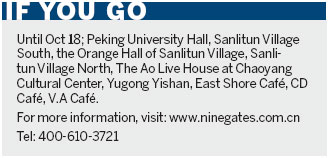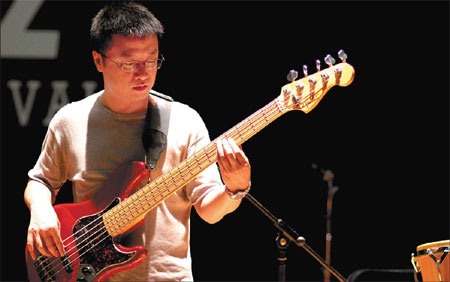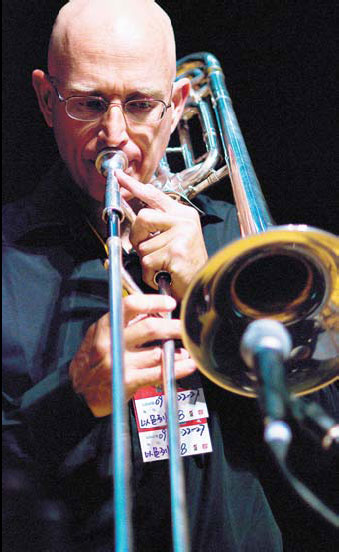Life and Leisure
Jazz takes root
By Chen Nan (China Daily)
Updated: 2010-10-12 08:02
 |
Large Medium Small |
|
Beijing-based jazz player Huang Yong is the founder of Nine Gates Jazz Festival, which is running until Oct 18. Photos Provided to China Daily |
|
Israel's Shem-Tov Levy is one of 19 international acts playing at the festival. |
The ongoing Nine Gates Jazz Festival in Beijing features the best musicians the country has to offer, plus international acts. Chen Nan reports
It's late and East Shore Cafe, a jazz bar in Beijing's Houhai district, is packed. On stage are saxophonist Liu Yuan and bassist Huang Yong, both in their 40s and from Beijing. They jam up a storm with a succession of young amateurs, earning cheers from the audience.
The bar, owned by Liu, has become a magnet for jazz lovers and performers since it opened in 2006. Together with CD Caf, also opened by Liu, in 1999, the venues are a focus for live jazz in the city.
"If you take the time to listen, you can always find a type of jazz you like, so we try to offer a home for jazz lovers and also a place for people to get to know jazz," says bassist Huang, who has been a member of the Liu Yuan Jazz Quartet for a decade.
Huang took the idea a step further by hosting the Nine Gates Jazz Festival, which refers to the nine gates of Beijing's old inner city.
"I've seen lots of local jazz musicians put their instruments aside to do business or go abroad. A jazz player in China can't make a living," he says.
When Huang first organized the festival in 2006, he discussed with his longtime friend Liu which bands should be invited - but it was a depressing experience.
"We went through the CDs we had collected and could find no more than five local jazz bands. But we still made it with those five bands and a couple of foreign acts," Huang recalls.
Despite low ticket sales and few performers, Huang and his band of local jazz musicians kept the festival going every year at the Forbidden City Concert Hall.
"Some associate jazz with coffee, red wine and lazy afternoons, but I don't. I want to let people know jazz has different aspects, from rock 'n' roll to funk, folk and many others," Huang says.
Running until Oct 18, at 10 venues, more than 30 bands will play over 40 programs, in what Huang calls the most exciting festival of them all. "We have 18 Chinese bands playing at the festival, the largest number so far. Some of them are young and original and represent the current jazz powers in the country."
Huang recommends one band in particular, Decree Big Band, a funk-style group that will be performing for the first time at the festival. It has 11 members and most of them teach at music colleges across the country.
"They keep up with the latest world trends, which makes their music avant-garde and original. They are keen on experimenting. As long as the tune impresses their ears, they try to make it their own creation."
Up to 90 percent of Chinese jazz musicians gather in Beijing, Huang says.
"Shanghai's jazz scene is good but nearly all of the active jazz players and fans are foreigners. Beijing is different. You can sit in a caf with a bottle of beer and listen to a Chinese pianist playing jazz the whole night long. It can be quite surprising."
Liu Kefu, a 25-year-old jazz musician, will also make his debut performance at the festival. He has received classical music training since childhood, studying piano and French horn before he went to Vienna to further his studies. He fell in love with jazz after visiting a small bar there.
"Jazz covers various musical styles, such as Latin, Indian, African and North European. It's the kind of music that a musician can totally express himself in," says Liu Kefu, who is from Lanzhou, Gansu province.
"It's not like any other music, which is written beforehand. Jazz provides players enough room to imagine and create."
When he returned to China two years ago, he thought it would be hard to find a job as a full-time jazz player. To his surprise, he has had lots of offers.
"I know many Chinese jazz musicians who study or work abroad. The jazz scene here is getting better so they are willing to come back," says Liu Kefu, who will perform with his quartet at the festival.
"The big change was when local jazz musicians started making their own music," he says, adding that previously local musicians mainly copied Western jazz musicians.
"The younger generation is bound to surpass us now. They have the Internet and such a lot of information from other countries," saxophonist Liu Yuan says.
The festival will also feature bands such as Golden Buddha Jazz Unit, Beijing Jazz Orchestra and the Xia Jia Trio, who have participated in the festival since it began. In addition, there are 19 international bands from 13 countries scheduled to play at the festival, offering Chinese audiences a chance to learn more about the genre and the countries where the performers come from.
"When I listened to the music of the Israeli musician Shem-Tov Levy and his ensemble, I was eager to read books about Israel because his music contains so many interesting elements and I wanted to know more about it," Huang says.
Unlike previous years, the festival will be held at 10 venues, ranging from the Chang'an Grand Theater and Peking University, to bars and cafes. There will also, for the first time, be forums on jazz in the Houhai area, a center for Beijing jazz.


